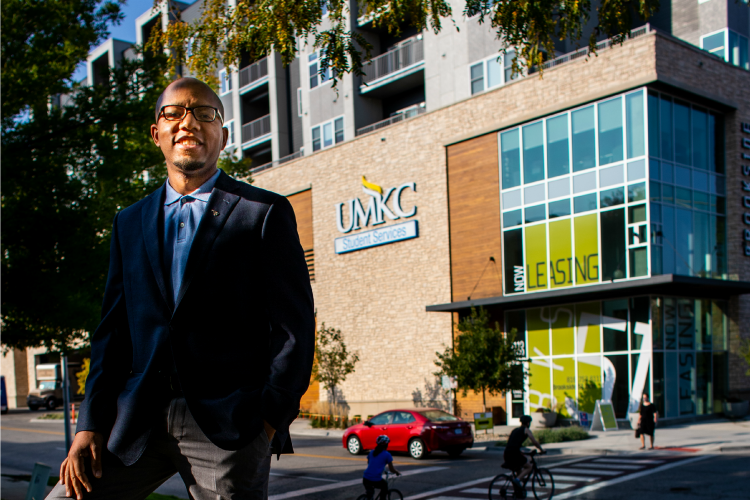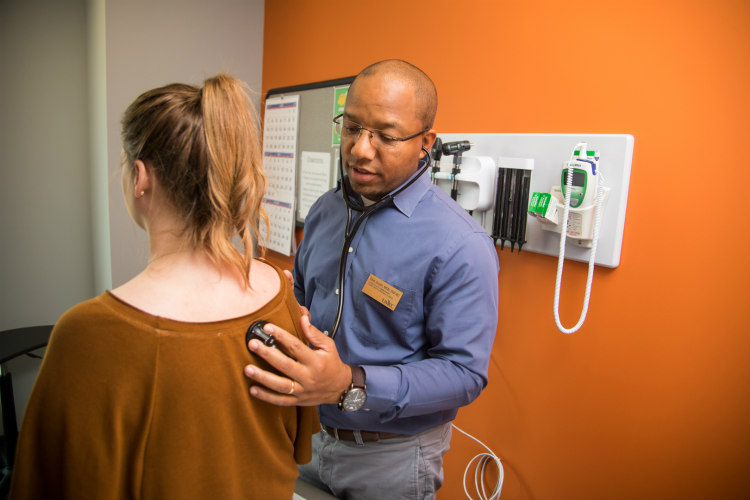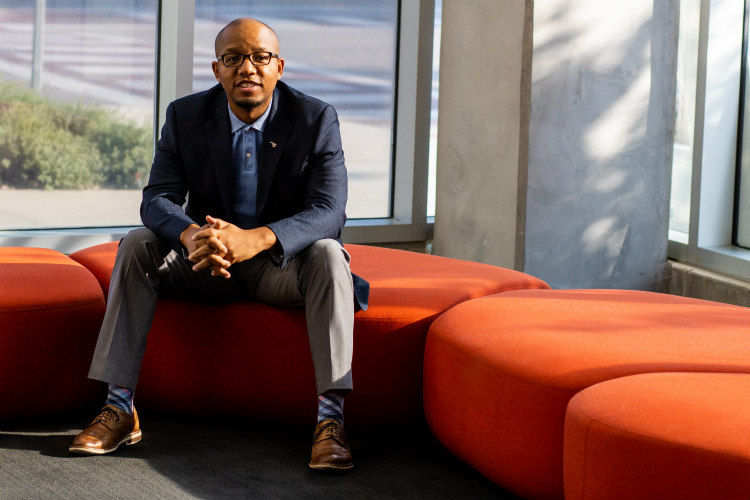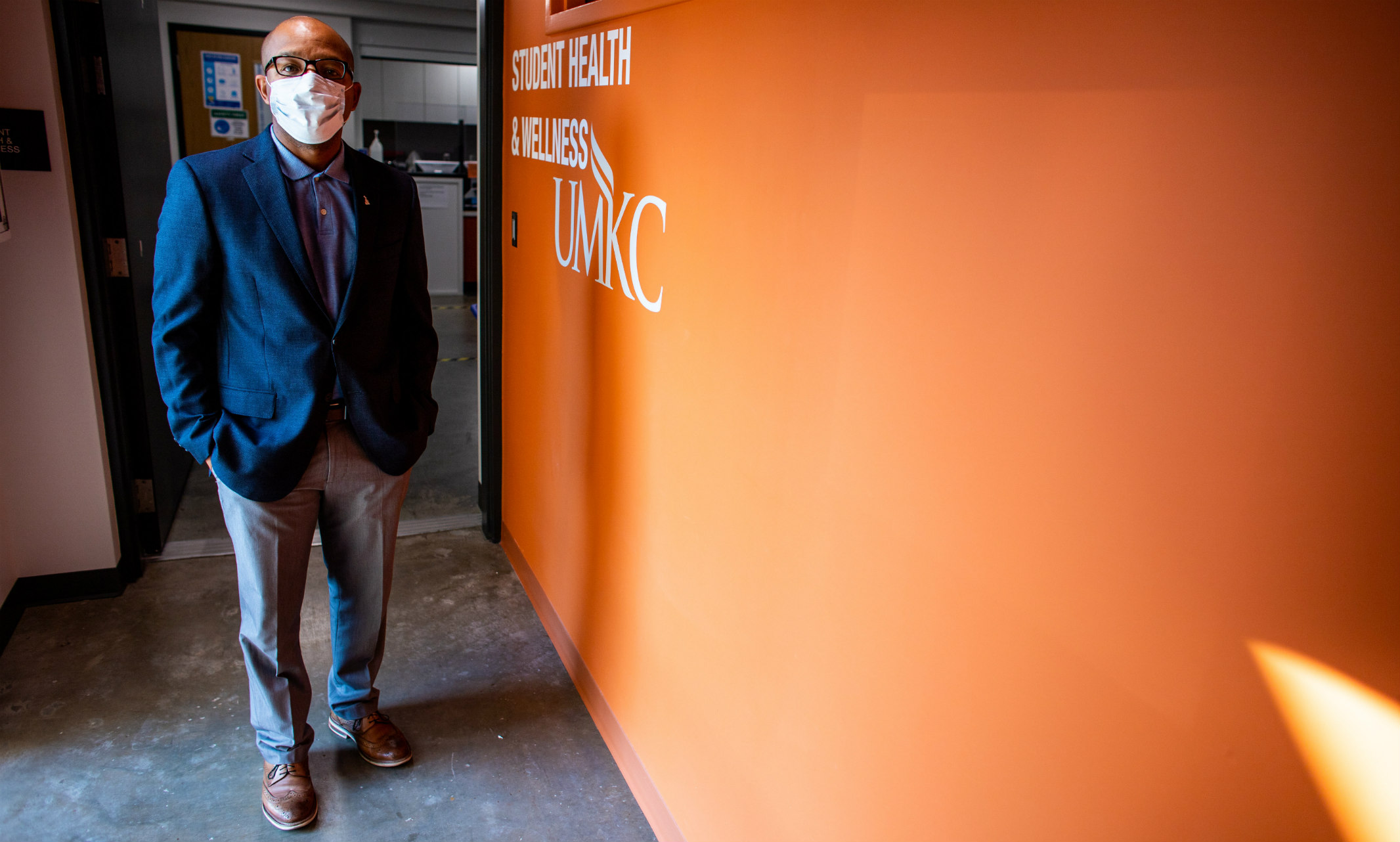The “Black Excellence At UMKC” series helps to increase awareness of the representation of diversity and equity on campus and show a visible commitment to the inclusion and recognition of Black faculty and staff. This series celebrates and highlights Black and Roo faculty and staff working behind the scenes and on the frontlines to help our university achieve its mission to promote learning and discovery for all people at UMKC and the greater Kansas City community.
Obie Austin, director of Student Health and Wellness, has been schooled by both life and a quality education at UMKC. He revels in the opportunity to take the lessons he’s learned and apply them for the benefit of his family, community and the students he mentors. And he’s still learning himself. Through his daily interactions and work on campus, he’s able to experience and learn about the many diverse people and cultures that exist within the UMKC community.

Name: Obie Austin
Role: Director, Student Health and Wellness
Tenure: 18 years
Hometown: Kansas City
University/Alma Mater: Missouri Western State College, UMKC
Degree Program: MSN Nursing
Why did you choose UMKC as the place to grow your career?
I came to UMKC as a student in 1996. Once I finished my program at the School of Nursing and Health Sciences, I was asked to stay on as an adjunct faculty. It sounded like an opportunity and I didn’t think about it much further. It turned out to be a passion. That short introduction to working with students was amazing. It shouldn’t have been because I was heavily involved in SGA as an undergraduate, but I found that I got the same warm and fuzzy feeling from helping people achieve their highest potential as I got from providing care to individuals and families.
"I am still fascinated by the body of knowledge I obtained on this very campus and how that continues to grow."
What do you enjoy most about working at UMKC?
Hands down, I enjoy the opportunity to change lives more than anything else I do. I understand the power of mentorship. Even if you don’t have a personal relationship with someone, just having the opportunity to see someone that looks like you succeed is an inspiration itself. Someone opened a door for me, and I revel at the chance to do that for others.
I learn daily. My interactions with others, specifically with others from so many varying cultures are intoxicating. If you’re willing to ask a question, the entire world opens up to you right here on our campus. I want to know why you have your name, what it means, and why your dialect is different from the other person here on campus from the same country. Cook some food and bring it to me so I can close my eyes and imagine being where you are from, why does your whole family have a certain pattern to the clothes they wear and what does it mean, I can go on and on…there’s so much to learn!
The campus is perfectly located, gorgeous and filled with young adults that remind me of myself and filled with people that have set out to change lives. Did I say that the power to change lives can be intoxicating?
How did you decide this career was right for you?
In the late 80s, we were having a nursing shortage and were at the beginning of the HIV epidemic. I worked at KUMC serving water to patients and the nurses asked if I was willing to help them with afterlife learning for their patients. I said sure because what boy wouldn’t want to see a dead person. Watching the nurse provide such respectful care of those patients lit a fuse, and the fire has been burning ever since. I immediately dropped out of engineering school (I had a 1.9 GPA anyway), took a year to get my grades fixed and ran off to nursing school never looking back.
I smile daily and love coming to work to do this job. I always wonder what more I can do. I am still fascinated by the body of knowledge I obtained on this very campus and how that continues to grow. Those are great signs that you are where you belong, right?
"What’s been unique about managing this pandemic is the fear. Fear is best handled with education, and we do that well here at UMKC."
What are the challenges of your career field?
You can’t fix everything. The world isn’t fair. I have a special place in my heart for minority students. We often face the trauma that the world and inequality have placed on these students and sometimes four years is not enough to unravel that trauma. It’s often disheartening. You want them to know that they can do anything if they believe it. Some you can inspire to achieve that goal and some you can’t.
That’s very personal for me because I’ve been there. I was lucky that someone got to me and planted a seed. They, then, stuck around to water the seed and witness the growth happen. I hope that I am a person that sticks around to pour the water.
From a care standpoint, sometimes you want so much for your patients but, for whatever reason, they are unable to get to their goal. That can be tough.

What are the benefits of your career field?
There is nothing better than saving a life. I get to do that in many ways -- providing healthcare, mentorship, education and counseling. It’s a very stable and noble profession with a great deal of flexibility and good compensation that helps me provide a good life for my family. It’s also a well-respected position that brings honor to the African American community.
What other roles have you had at UMKC?
Student, adjunct faculty, clinical instructor, associate professor, nurse practitioner, administrator, director… mentor
You’ve played an integral part in managing the university’s response to COVID-19, especially in tracking and monitoring cases and student health. How have your educational and career experiences equipped you to be able to lead at this time?
I’ve had the pleasure of serving our country in both the Army and the Navy. Leading through armed conflict, we learn to be still in chaos, be focused, be decisive and don’t hesitate to provide direction. These lessons follow me everywhere I go. I found these tenants of leadership to be helpful, especially at the beginning of the pandemic when there were so many unknowns and fears.
As a healthcare professional, we interact with illness as a normal part of our daily routine. We approach our jobs the same way every day so, in that regard, I felt well-prepared to handle COVID. What’s been unique about managing this pandemic is the fear. Fear is best handled with education, and we do that well here at UMKC.
I’ve also had the pleasure of working with some incredibly talented professionals, including staff and students. We’ve worked hard to keep this campus safe and support each other as we face the challenges of COVID.
"We have a lot to offer at UMKC."
Having been involved with UMKC in various capacities, you’ve gotten to work and connect with many different people. How do you connect and establish relationships with Black faculty and staff in other units and departments?
Race provides a sort of kinship through seemingly shared experiences. I think we all feel a little closer, unconsciously, to people that may have had a shared experience or who may look like we do. There is a familiarity that reminds you of a cousin, aunt or parent that makes the forming of relationships feel a little easier.
We are small in numbers on this campus, so it is honestly a little challenging to meet other folks that look like me. I try to just get out and participate where I can. Being involved in campus activities, attending meetings and serving on committees has been extremely helpful to me in building relationships on campus. I often walk the campus just to meet people in general. I have noticed that during the pandemic there are more concentrated efforts to gather as Black faculty and staff. This is very helpful, and I hope it continues. We have a lot to offer at UMKC.
You’ve spent much of your career serving in the urban core of Kansas City – whether working or volunteering at clinics or with youth groups. How are you currently involved in the Kansas City community outside of UMKC?
COVID has affected everything, even the ability to act and have time to volunteer.
I am currently most active with Rose Brooks Domestic Violence Center serving on their Medical Advisory Board. This is currently the only organized volunteer activity that I am committed to.
Individually, I’m actively mentoring about 10 young adults -- four young ladies that are here in nursing school and five young men that are post-high school students trying to figure out what’s next in their journey.
I continue to do safe sex and men’s health presentations throughout the community as asked, and I’m actively involved in helping my home church and other faith-based organizations plan how to safely reopen their doors during and after the pandemic.
"Someone opened a door for me, and I revel at the chance to do that for others."
How do you mentor and give back to students on campus?
My focus tends to be on the health professions students. I often offer my services as a mentor or tutor during lunch hours, but I find that my position in student health has given me a platform to reach all students. We have an opportunity to see students in venerable situations whether its illness-related, being homesick, or just lost under the weight of life. Here is where my education takes a back seat and my parenting skills kick in. Our students often need a listening ear and a familiar voice of assurance. As a middle-aged Black person on campus, we often fit the picture of a comforting parent. I try to take advantage of that role as often as possible.

What is one word that best describes you?
Resilient. Man, this life has thrown some things at me over the course of my 50-plus years! But my God has always seen me through. I’ve learned that if you have the ability to just stand, you can make it through any storm. So I just stand.
"I hope that I am a person that sticks around to pour the water."
What is one piece of advice you’d give a prospective faculty or staff member looking to grow their career at UMKC?
Allow yourself to be present here. The students are infectious and make you want to be better at what you do. Many people come and do their job and leave without out interacting with our young folks. They will make your days better if you let them.
What is one piece of advice you’d give a student wanting to follow in your footsteps?
Shadow a professional and make a friend that is doing what you want to do. Age does not always define friendship. There’s a lot to be learned from having a strong relationship with someone who has spent a little time in the shoes you want to wear.

